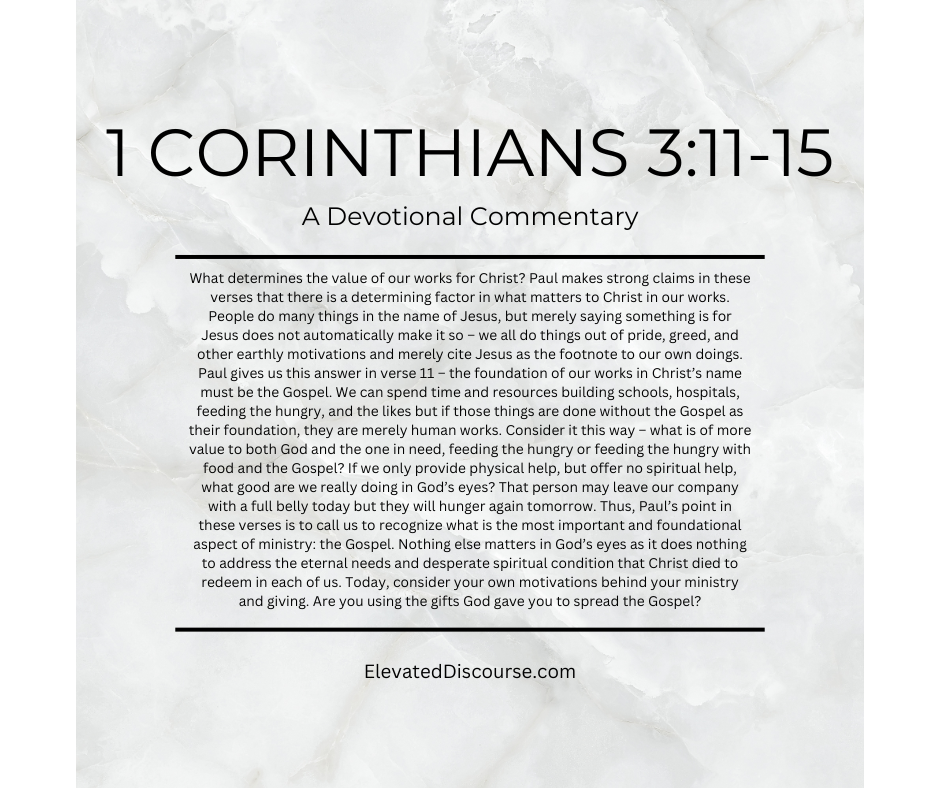1 Corinthians 3:11-15
- Elevated Discourse
- Dec 10, 2024
- 3 min read

Scripture: 1 Cor. 3:11 For no one can lay a foundation other than that which is laid, which is Jesus Christ.
1 Cor. 3:12 Now if anyone builds on the foundation with gold, silver, precious stones, wood, hay, straw—
1 Cor. 3:13 each one's work will become manifest, for the Day will disclose it, because it will be revealed by fire, and the fire will test what sort of work each one has done.
1 Cor. 3:14 If the work that anyone has built on the foundation survives, he will receive a reward.
1 Cor. 3:15 If anyone’s work is burned up, he will suffer loss, though he himself will be saved, but only as through fire.
Teaching: Paul, here, further describes the “foundation” with which he began the Corinthian church – Jesus Christ. Echoing his point in 1 Cor. 2:2, that Paul came to Corinth knowing “nothing among you except Jesus Christ and him crucified,” Paul is saying that the foundation of the church is the Gospel. To elucidate verse 11 further, one might say “for no one can build upon anything other than on Jesus THE Christ,” because the Gospel is that Jesus is the Christ, the King, the Lord, who died on the cross for our sins but arose three days later, triumphing over sin and death once and for all. The Gospel is what saves and provides eternal security and redemption for each of us.
Following this assertion, Paul adds some further insight into the function of the Church. Continuing the construction metaphor, Paul calls to attention what materials one might build with. He names substances like gold, silver, and precious stones (not your average building material but of high value) as well as wood, hay, and straw (extremely common materials with low value). In verse 13, Paul says that each “one’s” (member of the Church) work will be made “manifest” (Greek word phanaros which means “plainly recognized or known, evident, obvious”) on the “Day” (a reference to the Day of the Lord; on aspect of that Day is the judgement of the Church for rewards). Said another way, what each of us has done to serve Christ in this life will be revealed for what it truly was. Was it for us and our glory or for Christ’s and His?
There is more to understanding verses 14-15 than can be covered today, but see this aspect of verse 15 – even if the works one does are not of value to Christ/are burned up, that person is still saved. This is further proof that salvation is by faith alone and works are how we show faith and earn rewards at Christ’s coming.
Takeaway: What determines the value of our works for Christ? Paul makes strong claims in these verses that there is a determining factor in what matters to Christ in our works. People do many things in the name of Jesus, but merely saying something is for Jesus does not automatically make it so – we all do things out of pride, greed, and other earthly motivations and merely cite Jesus as the footnote to our own doings. Paul gives us this answer in verse 11 – the foundation of our works in Christ’s name must be the Gospel. We can spend time and resources building schools, hospitals, feeding the hungry, and the likes but if those things are done without the Gospel as their foundation, they are merely human works. Consider it this way – what is of more value to both God and the one in need, feeding the hungry or feeding the hungry with food and the Gospel? If we only provide physical help, but offer no spiritual help, what good are we really doing in God’s eyes? That person may leave our company with a full belly today but they will hunger again tomorrow. Thus, Paul’s point in these verses is to call us to recognize what is the most important and foundational aspect of ministry: the Gospel. Nothing else matters in God’s eyes as it does nothing to address the eternal needs and desperate spiritual condition that Christ died to redeem in each of us. Today, consider your own motivations behind your ministry and giving. Are you using the gifts God gave you to spread the Gospel?









Comments